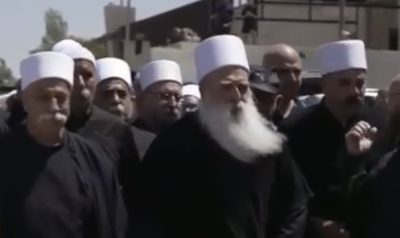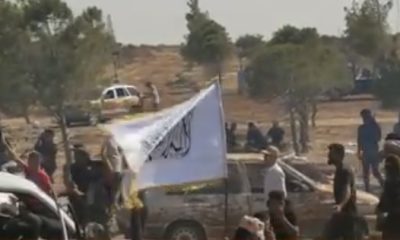Middle East’s Forgotten Persecutions (Druze to Kurds)
Kanako Mita, Sawako Utsumi, and Lee Jay Walker
Modern Tokyo Times

The international gaze remains fixated—almost obsessively—on the Israeli-Palestinian conflict, as if it alone encapsulates the suffering and injustice of West Asia (Middle East). But this narrow focus obscures a far wider and more brutal tapestry of ethnic cleansing, religious persecution, and state-sponsored oppression playing out across the region.
The Kurds, the largest stateless ethnic group in the Middle East, remain crushed under the boot of four different regimes—Iran, Iraq, Syria, and Turkey. Despite their historic lands and distinct identity, they are offered no homeland, no justice—only repression, bombings, and betrayal. In Turkey, a NATO member, Kurdish villages are shelled and Kurdish language and culture suppressed. Likewise, in Iran and Syria, they are treated as dangerous aliens within their ancestral lands. Iraq uses them when convenient, then sidelines or suppresses them when power dynamics shift. The world remains silent (or empty promises when they are needed to support America).
Egypt, often painted as a beacon of “moderation,” continues to marginalize its indigenous Coptic Christian population, the original heirs of ancient Egyptian civilization. Under layers of bureaucracy and Sharia-influenced legal systems, Copts live in the shadow of Islamist majoritarianism—always one election away from renewed persecution. Their churches are torched (during internal political convulsions), their communities attacked, and justice is elusive.
In Syria, far from the Western narrative of simple heroism versus tyranny, a deeper, bloodier truth unfolds. This year alone, Sunni Islamist militants have carried out pogroms against Alawites, Druze, and Christians, executing people in cold blood for their sect or faith. The West, along with Gulf allies, watches silently—even complicitly—as ethnic and religious cleansing continues, unpunished and unremarked. Accordingly, thousands of Alawites and Druze were butchered by Sunni Islamists during brutal pogroms.
Meanwhile, ISIS still holds Yazidi women and children as slaves—years after the caliphate was supposedly “defeated.” Iraq, a nation in name only, is a battleground for regional powers. Iran commands vast influence in Baghdad’s halls of power, while Sunni-Shia fault lines fracture daily life. The Kurds, once hailed as heroes against ISIS, are now bombed by Turkey, their autonomy eroded and their sacrifices forgotten (the Kurds – despite recent overtures with Turkey – remain in a fragile state vis-a-vis NATO Turkey).
Minority religious groups in Iraq—Christians, Mandaeans, Yazidis, Shabaks, and others—live under a regime of systemic apartheid, codified in Islamic Sharia laws that reduce them to second-class citizens, if not enemies of the state.
The world’s obsession with the Israeli-Palestinian conflict has blinded it to a devastating truth: the Middle East (West Asia) and North Africa are ablaze with conflicts, persecutions, and civil wars that have nothing to do with that singular, long-frozen stalemate. This fixation has become a dangerous distraction—one that allows far greater atrocities to go unanswered.

In Sudan, a true genocide unfolds before our eyes. Arab Muslim militias are butchering Black African ethnic groups in Darfur, repeating the horrors of the early 2000s with renewed fury. And yet again, the world looks away. The carnage is not only racial—it is sectarian and tribal. Across Sudan, Arab Muslim factions turn on one another in an orgy of blood and betrayal, with cities reduced to rubble and civilians treated as collateral.
Libya—once a functioning state—is now a fractured arena of proxy wars, warlords, and foreign meddling. Turkey, a NATO power, plays a deeply destabilizing role, propping up factions aligned with political Islam while pursuing its own neo-Ottoman fantasies. Erdogan’s Turkey is not a force for stability, but for radicalism and chaos, from Libya to Syria to the Kurdish regions it bombs without remorse if any threaten his long-term goal (neo-Ottoman).
In Yemen, the poorest country in the Arab world has become the battleground for a cold war between Iran and Gulf monarchies, fought with bullets, starvation, and mass suffering. The conflict is more than a civil war—it is sectarian disintegration, with Sunni, Shia, tribal, and regional identities tearing the country apart. Children starve, cities fall, and Western powers sell weapons with averted eyes.
Lebanon, once the Paris of the Levant, now teeters on the brink. Its fragile sectarian balance—already shaken by decades of corruption and war—has been upended by the influx of Palestinian and Syrian refugees, causing deep demographic shifts. The Christian-Muslim balance that held the country together is no longer sustainable. Meanwhile, the Druze elite in Lebanon spend more energy echoing slogans against Israel than protecting their persecuted kin in Syria—where Sunni Bedouins (supported by Sunni Islamists) have attacked Druze villages, prompting Israel, ironically, to offer aid and protection to the very people whose leaders still denounce it.
Turkey’s regional role is malign—not only for its persecution of Kurds across three countries, but for its ideological alignment with the Muslim Brotherhood, both at home and abroad. Erdogan’s regime undermines secularism, inflames sectarianism, and fuels instability from the Mediterranean to the Gulf.
Jordan, under the Hashemite monarchy, appears calm—but it is fragile to the core. With a massive Palestinian population, internal tensions, and dependence on Gulf and Western support, it walks a tightrope. One wrong step could see it fall into the same abyss engulfing its neighbors.
So let us be clear: To equate “Middle East peace” with “resolving the Palestinian question” is not only naïve—it is a dangerous falsehood. It is a lie that has obscured genocides, erased ethnic minorities, and ignored state failures across the region. From the blood-soaked sands of Darfur to the ruins of Aleppo and the starving children of Taiz, the Middle East’s agony is far deeper and far broader than one conflict.
Until the world opens its eyes to the full map of suffering, the fires will only spread.

Modern Tokyo News is part of the Modern Tokyo Times group
http://moderntokyotimes.com Modern Tokyo Times – International News and Japan News
http://sawakoart.com – Sawako Utsumi’s website and Modern Tokyo Times artist
https://moderntokyonews.com Modern Tokyo News – Tokyo News and International News
PLEASE JOIN ON TWITTER
https://twitter.com/MTT_News Modern Tokyo Times
PLEASE JOIN ON FACEBOOK
https://www.facebook.com/moderntokyotimes